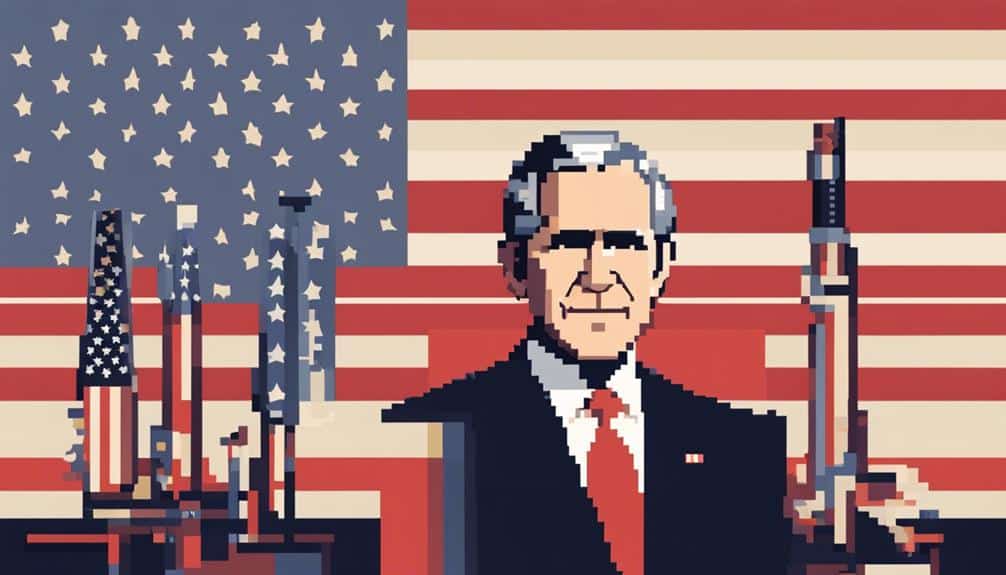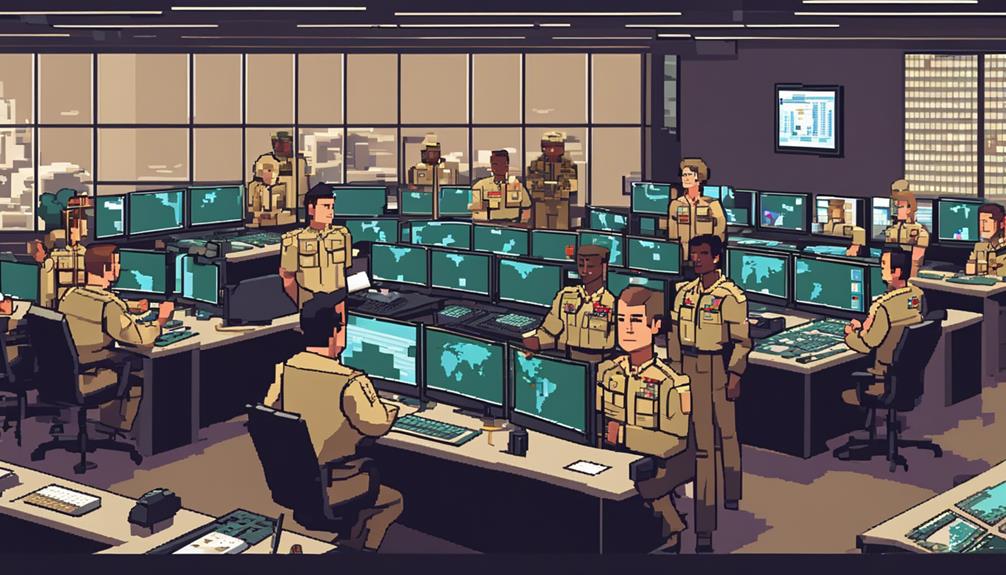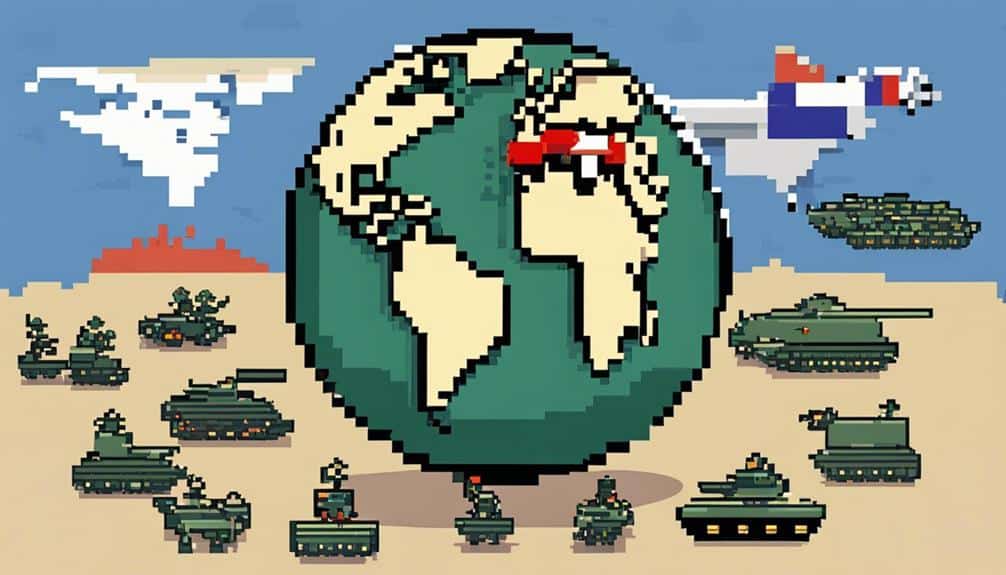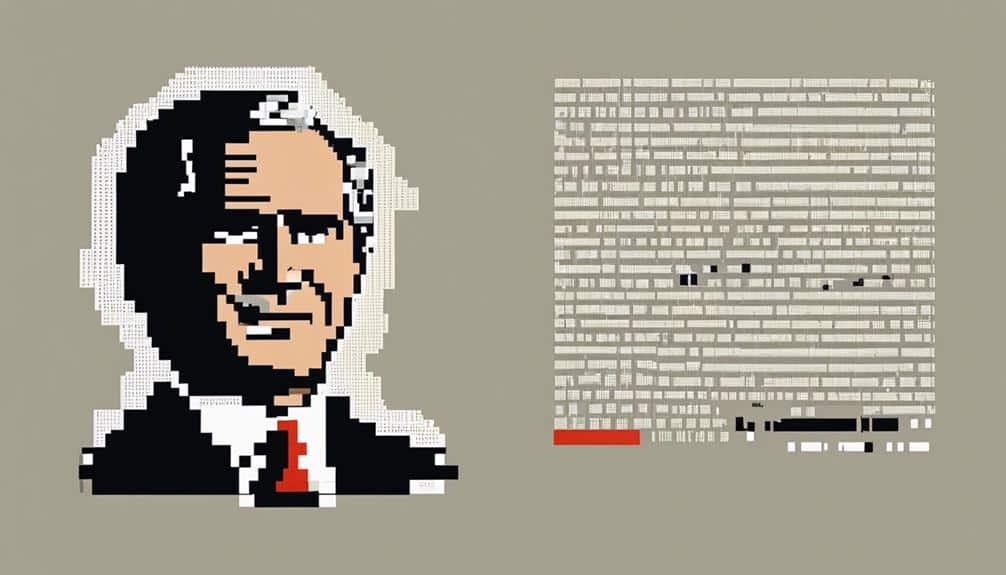Ah, George W. Bush, the master of unintentional comedy! His statement about enemies being innovative sounds like a plotline straight out of a spy movie. Envision this: Bond villains cooking up schemes in secret lairs, while our government plays catch-up like a bumbling spy agency in a slapstick comedy. It's a real-life game of cat and mouse, where the mice seem to have all the cool gadgets. But hey, if you stick around, you might just uncover more about this comical world of national security and the quest for the ultimate spy vs. spy showdown!
Historical Context

Explore the historical context of George W. Bush's perspective on innovation and resourcefulness through a lens of economic challenges and technological advancements.
Back in the early 2000s, when flip phones were all the rage and dial-up internet was still a thing, George W. Bush was all about embracing innovation. He believed in the power of creativity to tackle economic hurdles and technological leaps to propel society forward.
Imagine this: Bush, in his cowboy boots and Texan drawl, championing the idea that new-fangled gadgets and gizmos were the keys to unleashing prosperity. He was like a modern-day cowboy, riding the waves of change with a BlackBerry in hand, ready to conquer the digital frontier.
In a world where Y2K was a looming threat and MySpace was the epitome of social networking, Bush's call for innovation was a rallying cry for a nation on the brink of a tech revolution.
National Security Strategies

So, you're all about keeping things secure, right?
Well, when it comes to national security strategies, you've got to have some high-quality threat assessment methods in place.
And hey, let's not forget those counterterrorism measures – can't be too careful these days, can you?
Threat Assessment Methods
Evaluating threats through strategic intelligence analysis plays a pivotal role in shaping effective national security strategies. Imagine a team of analysts huddled around a table, sipping on their coffee, and pondering the next big threat to the nation. It's like a real-life game of chess, but with higher stakes and no cool hats.
These analysts are like modern-day Sherlock Holmes, except instead of solving crimes, they're preventing them. Through sophisticated data collection and analysis, these wizards of threat assessment sift through a mountain of information to identify potential risks.
From cyber attacks to biological warfare, nothing escapes their watchful eyes. It's like being a detective in a high-stakes thriller, except the only gun you're wielding is a pen.
Counterterrorism Measures
Imagine this: a team of agents huddled around a table, sipping coffee and brainstorming ways to outsmart the bad guys. It's like a real-life game of chess, but with higher stakes and no fancy hats.
These agencies are the unsung heroes of our modern world, always one step ahead of the curve, like a ninja in a suit.
From monitoring suspicious activities to infiltrating underground networks, these agencies leave no stone unturned in their quest to keep us safe.
It's like a high-stakes game of hide and seek, except the seekers have night vision goggles and a knack for deciphering encrypted messages.
Impact on Foreign Policy

So, you think tackling foreign policy implications is a walk in the park? Well, get ready for a diplomatic rollercoaster ride with more twists and turns than a political thriller.
The challenges ahead might just make the United Nations General Assembly look like a kindergarten debate club.
Get your passport ready, because maneuvering these waters will require more finesse than a seasoned diplomat at a cocktail party.
Foreign Policy Implications
Innovative approaches in addressing global challenges can greatly influence foreign policy decisions and relationships. When it comes to maneuvering the complex web of international affairs, here are a few things to keep in mind:
- Diplomacy is like a game of chess, but with more players and fewer clear rules. Remember, sometimes sacrificing a pawn can protect your queen.
- Building alliances is essential, just like forming study groups in school – you never know when you might need help with that tricky math problem or a United Nations resolution.
- Communication is key, whether you're sending a text to your friend or drafting a peace treaty. Emojis mightn't be appropriate in official documents, though.
- Understanding cultural nuances is crucial. Think of it as deciphering the latest slang terms – one wrong move could lead to a diplomatic disaster.
- Negotiation skills are paramount. It's like haggling at a flea market, but instead of a vintage lamp, you're bargaining for world peace.
Diplomatic Challenges Ahead
Maneuvering through the diplomatic challenges ahead will require a keen understanding of global dynamics and a strategic approach to shaping foreign policy decisions. As you navigate the intricate web of international relations, get ready to juggle more balls than a circus performer on caffeine.
From negotiating trade deals to smoothing out political tensions, you'll need the finesse of a diplomat and the wit of a stand-up comedian.
Picture yourself at a fancy diplomatic dinner, trying to impress foreign dignitaries with your knowledge of obscure customs and your ability to eat with chopsticks. It's like a high-stakes game of cultural charades, where one wrong move could send you tumbling into a diplomatic faux pas.
But fear not, intrepid diplomat! Armed with your trusty briefcase full of talking points and your diplomatic immunity card, you'll charm your way through even the stickiest of situations.
Just remember, in the world of international relations, a well-placed joke can be mightier than a thousand sanctions. So go forth, brave negotiator, and conquer those diplomatic challenges with grace, humor, and a touch of strategic cunning.
Public Perception and Criticisms

Public opinion on George W. Bush's statement on innovation and resourcefulness has been met with a mix of praise and criticism. Here's a breakdown of what people are saying:
- Some applaud his frankness, labeling it as a bold and unfiltered perspective.
- Others raise an eyebrow, wondering if maybe thinking too much about harming others isn't the best approach.
- A few have taken to social media, creating memes that show Bush with a thinking cap on, brainstorming ways to out-innovate the enemy.
- Critics argue that maybe a little more focus on peace and cooperation could go a long way.
- Supporters counter that in a world where competition is fierce, perhaps a touch of competitive spirit isn't such a bad thing.
In a world full of opinions and hot takes, one thing's for sure – Bush's words have definitely sparked a conversation that's as innovative and resourceful as the enemies he mentions.
Legacy in Homeland Security

His administration's legacy in homeland security is characterized by significant policy changes and responses to national security threats. You see, George W. Bush really shook things up in the homeland security arena. From creating the Department of Homeland Security to implementing controversial surveillance programs, he left a lasting impact on how the country approaches security.
Remember those color-coded threat levels? Thanks to Bush, we all became experts in deciphering whether we were at orange or yellow alert. It was like playing a real-life game of 'Is this a drill or the real deal?'
And who could forget the enhanced airport security measures? Taking off your shoes and belt, emptying your pockets, and trying not to look suspicious while being scanned by a machine – all part of the Bush-era airport experience.
Sure, there were criticisms and debates, but one thing's for sure – Bush's legacy in homeland security definitely made us all more vigilant, whether we liked it or not.
Lessons for Future Administrations

Drawing from George W. Bush's approach to homeland security, future administrations can learn the importance of adaptability in responding to evolving threats.
Here are some witty and satirical lessons for you:
- Stay Informed: Remember, knowledge is power. Keep up with the latest trends in cyber threats, bioterrorism, and ninja attacks.
- Build Relationships: Don't just focus on enemies; make friends too. You never know when that alien civilization might come in handy.
- Think Outside the Box: Traditional methods may not always work. Maybe try using a giant rubber band to repel incoming threats next time.
- Invest in Technology: Get yourself some fancy gadgets. A laser-shooting umbrella or a jetpack could be just what you need to outsmart the bad guys.
- Train Your Team: A well-prepared team is essential. Consider implementing surprise drills like 'The Great Escape: Office Edition' to keep everyone on their toes.
Conclusion
So, to wrap things up, let's all take a moment to appreciate the innovative thinking of our enemies and our own government. After all, who knew that the best way to protect our country was to constantly think about new ways to harm it?
It's a real tribute to our resourcefulness and dedication to national security. So, keep on thinking outside the box, folks, because you never know when a new threat might just be around the corner. Stay vigilant, and stay sarcastic!
